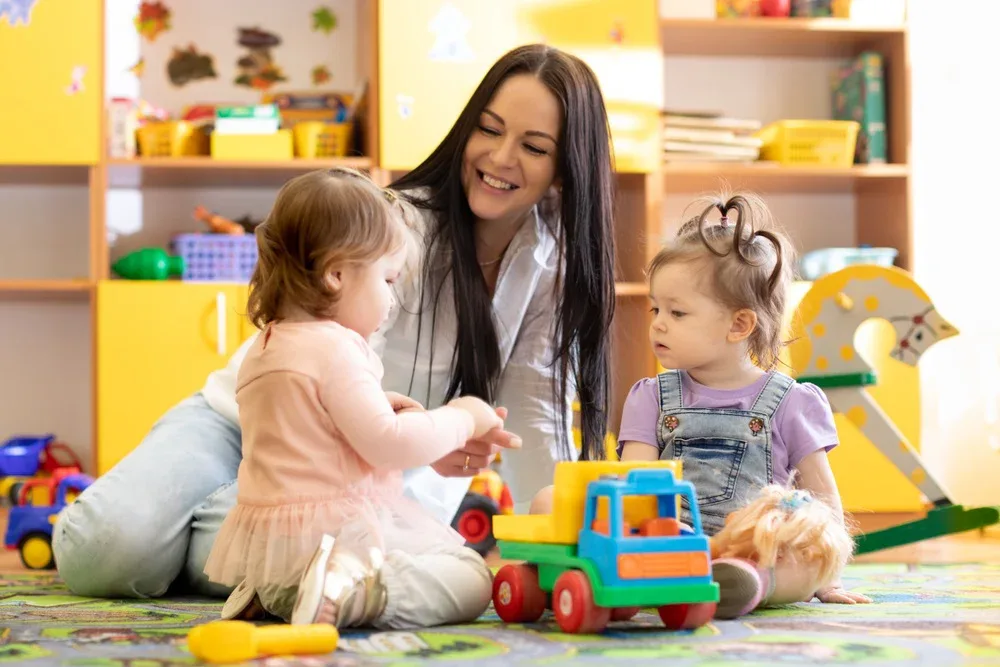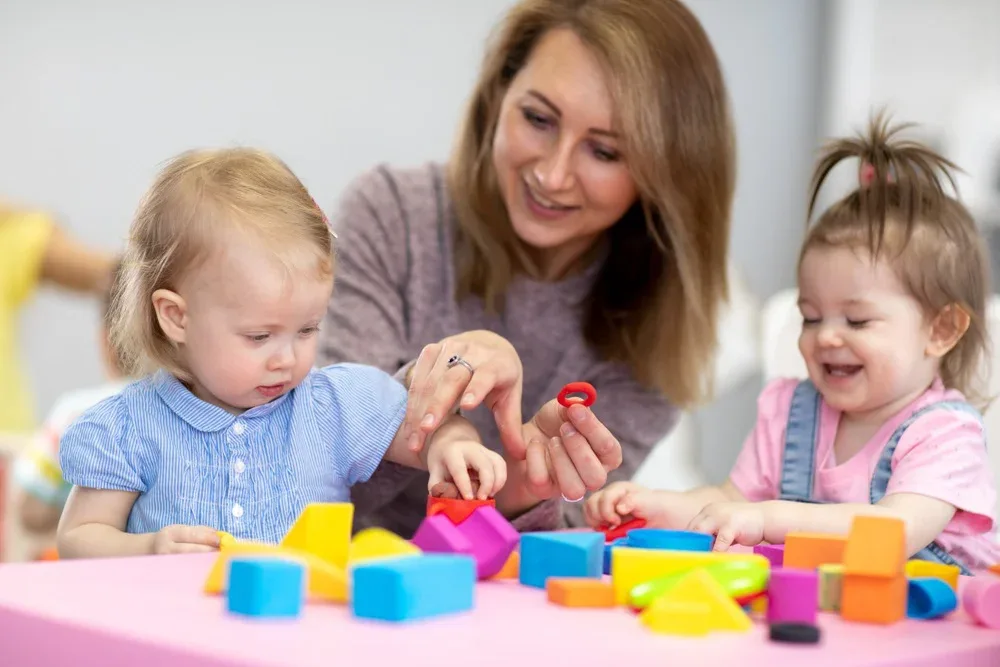
Infant daycare is a secure environment for early learning and social interactions. Caregivers focus on individualized care, promoting cognitive and emotional development through age-appropriate activities. This vital service supports working parents and lays a crucial foundation for infants’ overall well-being.
This technique of caregiving is a pivotal aspect of infant daycare, fostering the holistic development of young minds. Understanding the significance of this important role is crucial for parents seeking the best environments for their infants. In this comprehensive guide, we delve into the multifaceted aspects of responsive caregiving, exploring its role, benefits, challenges, and practical techniques for implementation.
Contents
- 1 The Role of responsive caregiving
- 2 Benefits
- 3 Challenges and Solutions
- 4 Techniques
- 5 FAQs
- 5.1 How does responsive caregiving benefit infants?
- 5.2 What qualities should I look for in a daycare provider?
- 5.3 How can parents reinforce caregiving at home?
- 5.4 Are there specific signs of a responsive daycare center?
- 5.5 How does prompt caregiving impact a child's future relationships?
- 5.6 What if my child has special needs?
- 6 Conclusion
The Role of responsive caregiving
The core of responsive caring is watching the distinct behaviors exhibited by each child and adjusting both the surroundings and your behavior to be receptive to their actions, noises, and facial expressions as a means of communication.
Building Trust and Security
This approach establishes a foundation of trust and security for infants. When caregivers promptly attend to an infant’s needs, whether feeding, changing, or soothing, it creates a secure attachment. This emotional security is fundamental for healthy infant development.
Emotional and Cognitive Development
The emotional and cognitive development of infants is significantly influenced by responsive caregiving. Engaging with infants through play, conversation, and affectionate interactions stimulates their cognitive abilities, laying the groundwork for future learning.
Physical Well-being
Beyond emotional and cognitive aspects, this method of caregiving also contributes to an infant’s physical well-being. Regular checks, appropriate feeding, and maintaining a clean and safe environment are integral components of ensuring the child’s overall health.
Benefits
Responsive caregiving, characterized by attunement to a child’s needs and prompt, empathetic responses, yields numerous benefits for both the caregiver and the child. By fostering a secure attachment, responsive caregiving builds a foundation of trust and emotional well-being in children. This approach enhances cognitive development as caregivers engage in meaningful interactions that stimulate the child’s curiosity and learning.

Furthermore, when kids gain the confidence to express their needs and feelings effectively, responsive caregiving helps them develop effective communication skills. For caregivers, the practice promotes a deeper understanding of the child’s unique personality and enhances the overall quality of the caregiving relationship. In essence, the benefits of it extend far beyond immediate comfort, laying the groundwork for positive emotional, social, and cognitive outcomes in the child’s future.
Enhanced Social Skills
Infants exposed to responsive caregiving tend to develop enhanced social skills. Interacting with caregivers and fellow infants cultivates a sense of empathy, cooperation, and effective communication from an early age.
Positive Impact on Brain Development
Scientific studies affirm that responsive and appropriate caregiving has a positive impact on brain development. The responsive interactions create neural connections that support cognitive functions, setting the stage for lifelong learning.
Long-term Psychological Well-being
The emotional bonds formed through responsive caregiving contribute to long-term psychological well-being. Children who experience responsive care tend to have healthier relationships and a more positive outlook.
Challenges and Solutions
Infants encounter numerous challenges as they navigate early life. Communication without verbal language, developing motor skills, irregular sleep patterns, and understanding emotions pose hurdles. Yet, with resilient adaptability and supportive caregiving, infants navigate these challenges, setting the stage for their crucial growth and development.
These challenges may arise in understanding and meeting the unique needs of each infant. Caregivers can overcome this by actively observing and adapting their approach to align with each child’s individual preferences and development pace.
Overcoming Communication Barriers
Effective communication is key in responsive caregiving. Caregivers should establish open channels with parents, ensuring a seamless exchange of information about the child’s daily experiences, needs, and milestones.
Techniques
Responsive caregiving techniques involve attentive and empathetic responses to a child’s cues and needs. Caregivers, attuned to the child’s signals, provide prompt comfort, soothing, and engagement. This approach fosters a secure attachment, promoting emotional well-being and trust. Techniques include maintaining eye contact, responding promptly to cries, and adapting caregiving strategies to the child’s preferences.

By consistently practicing responsive caregiving, caregivers establish a strong foundation for positive social, emotional, and cognitive development in the child. To guarantee that a child feels heard and appreciated, you can also participate in responsive interactions by observing their indications and reacting accordingly.
Active Listening
Active listening is a cornerstone among caregiving techniques. Caregivers can discern their needs and respond promptly and appropriately by attentively tuning into an infant’s cues.
Prompt Responsiveness
Prompt responses to an infant’s signals create a sense of security. Whether it’s a cry for attention or a smile of contentment, acknowledging and responding promptly fosters a strong caregiver-infant bond.
Creating a Stimulating Environment
Responsive caregiving extends beyond basic needs; it involves creating a stimulating environment. Age-appropriate toys, varied sensory experiences, and engaging activities contribute to the overall development of infants.
Selecting a Responsive Daycare Center
Choosing a responsive daycare center requires thorough research. Visit potential centers,, and inquire about their approach to care responsively for your child.
Evaluating Staff Responsiveness
An essential criterion for selecting a daycare center is the responsiveness of its staff. Responsive caregivers understand each child’s individual needs and provide a nurturing environment that promotes growth.
FAQs
How does responsive caregiving benefit infants?
It benefits infants by establishing a secure attachment, promoting emotional and cognitive development, and contributing to overall well-being. This secure attachment becomes a foundation for future healthy relationships and emotional resilience.
What qualities should I look for in a daycare provider?
In selecting a daycare provider, seek commitment to responsive caregiving, effective communication, a stimulating environment, and a nurturing approach that recognizes and meets each child’s unique needs.
How can parents reinforce caregiving at home?
Parents play a crucial role in reinforcing responsive caregiving at home by actively engaging with their infants. Responding promptly to their needs, creating a secure and stimulating home environment, and fostering open communication contributes to extending positive caregiving experiences from daycare to home.
Are there specific signs of a responsive daycare center?
A responsive daycare center exhibits attentive and caring staff, open communication channels with parents, and a stimulating environment tailored to the developmental needs of infants. Signs include caregivers who actively listen, promptly respond and create a warm supportive atmosphere.
How does prompt caregiving impact a child's future relationships?
It positively influences a child’s future relationships by fostering secure attachments. The trust, empathy, and effective communication skills instilled through this attentive method of caregiving contribute to healthy relationship dynamics later in life.
What if my child has special needs?
Caregivers in a responsive childcare setting should receive training to meet the particular needs of kids with special needs. This entails working with experts, establishing a welcoming and inclusive environment, and making sure that tailored care plans are in place to address the child’s particular needs.
Conclusion
In conclusion, the importance of responsive caregiving in infant daycare cannot be overstated. The lasting impact on emotional, cognitive, and social development lays the foundation for a child’s future. Choosing a suitable daycare center is a significant step toward ensuring every infant’s bright and nurturing start. Take a tour to Deecyda to see our responsive daycaring programs for your child’s development and wellbeing.

